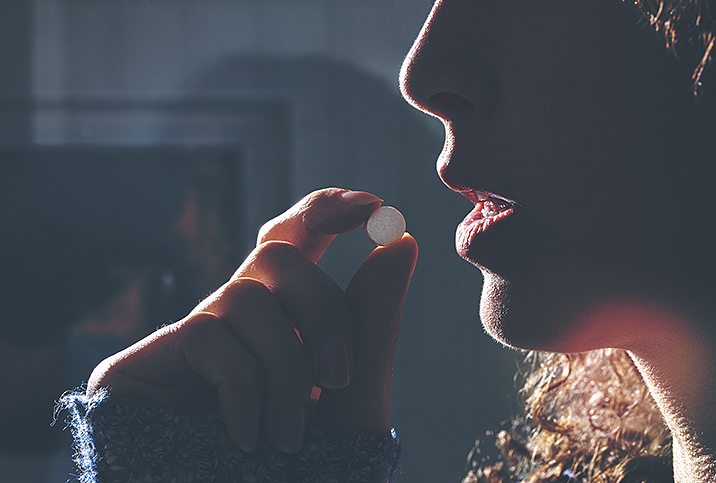Finding the Relationship Between Depression and Erectile Dysfunction

Men suffering from depression can also suffer from erectile dysfunction (ED), and men suffering from erectile dysfunction may also struggle with depression. This raises the question as to just how these conditions correlate.
Research confirms the prevalence of these comorbid conditions in men, but medical professionals cannot conclude a causal relationship between depression and erectile dysfunction, according to Sirpi Nackeeran, M.D., M.P.H., a first-year resident physician in urology at the University of California, San Diego.
Relevant literature, however, suggests men who experience ED are likely to deal with more severe depression, and men suffering from depression are likely to face more erectile function challenges. The former circumstance can be due to social stigma, self-confidence issues and consequent negative effects on relationships, Nackeeran noted. The latter can be attributed to psychogenic ED or even the side effects of antidepressant medications. Low testosterone can also lead to both ED and depression.
Authors of a paper published a decade ago in the Journal of Sexual Medicine conducted a systematic review and meta-analysis of 12 studies. Six focused on depression and the risk of sexual dysfunction and involved more than 3,000 participants followed from two to nine years. Six other studies pertained to sexual dysfunction and depression risk and involved more than 11,000 subjects followed from one to 10 years.
They concluded there's a "bidirectional relationship between depression and sexual dysfunction."
The case for ED leading to depression
Nackeeran co-authored a study published in the Journal of Sexual Medicine. The study controlled for confounding variables and found ED is associated with major depressive disorder.
"From my study alone, we can't necessarily say that ED causes or contributes to depression," Nackeeran explained. "Ultimately, it will always be difficult to determine the exact relationship between ED and depression because so many factors affect both issues. However, studies like mine, which showed that men who were treated were less likely to be depressed, indicate that ED does contribute to depression for a lot of men."
As Nackeeran noted, the study indicated men who were treated for erectile dysfunction had lower rates of depression.
"The effectiveness of the treatment was certainly something that we would have [liked] to assess, but unfortunately, we were limited by what the database could actually tell us," Nackeeran acknowledged. "We were only able to say that receiving the treatments was helpful, but this remained pretty consistent whether the treatment was medical or surgical."
To Nackeeran's knowledge, no existing guideline directs doctors to treat ED in men suffering from both issues. Enough evidence links the conditions, however, that it's worth at least trying to address both to improve patients' erectile function.
"Most erectile dysfunction treatments are low risk," Nackeeran said. "So it's worth letting men know that if this is an issue for them, we as physicians are able to help. It's likely that men with depression may not be as willing to seek treatment for their ED, and so finding the right balance of encouraging patients while respecting their decisions is key."
Administration of sildenafil citrate to treat ED showed an association between improvement in erectile function and subsequent improvement in symptoms of depression. Quality of life improved, too. Those were the results from a 12-week, randomized, double-blind and placebo-controlled trial published in 2001 in the American Journal of Psychiatry. The small study involved 152 men with mild to moderate depression and whose ED had lasted six months or more.
A similarly designed 12-week study was published in the same journal five years later. It involved 280 men who had ED for a minimum of six months and an untreated and mild form of major depression. Results showed treatment of ED with vardenafil "produced statistically significant and clinically meaningful improvement in all erectile function parameters."
But the study suggested more. First, it further demonstrated considerable improvements in depressive symptoms for men who received the ED drug. Second, it found positive changes in a primary measure of erectile function proved to be the best predictor of improvement in depressive symptoms.
Mental health issues, keep in mind, are complex and multifactorial, meaning there are myriad factors contributing to or influencing them, according to Vadim Osadchiy, M.D., a resident in urology at UCLA Health in Los Angeles.
If problems with erectile function are the primary causes of psychosocial distress, then treating the ED ought to help address depressive symptoms, he added.
"I suspect, though, that the opposite is more likely to be true," Osadchiy suggested.
The case for depression leading to ED
Osadchiy said he wouldn't be surprised if a subset of people afflicted with depression and ED could regain erectile function and improve erections if they were to receive appropriate mental health treatment. He stressed, though, that success is not guaranteed. What works for one individual might not work for another.
Ample evidence points to clinical depression doing one of two things: leading to ED or making a man more likely to develop difficulties with erectile function, Nackeeran said. He highlighted a 2018 meta-analysis published in the Journal of Sexual Medicine that showed men who present with depression are also likely to have ED.
Psychogenic sexual dysfunction is a germane factor here, he added.
"Being in the right mental state is important for sexual function, and clinical depression can certainly prevent a man from achieving satisfactory erections," Nackeeran explained.
His review of the literature leads him to believe there's yet to be a great study demonstrating a link between treating depression and improvement in ED. Nor has he seen a quality trial that examines how treatment for depression affects ED in men struggling with both.
The sexual side effects of depression medications introduce other challenges in determining whether successfully treating one can be tantamount to effectively treating the other.
"The best way to think about ED and depression is as a two-way relationship," Nackeeran said. "Either one can cause the other, and likely both are contributing to each other in men who have both. From a patient perspective, it's important to keep in mind that mental health and sexual health are all part of your overall state of health. It is important to seek help if you are struggling."
The need to destigmatize depression and ED
A guy may find it difficult enough to come into a urologist's office with ED, Osadchiy said. Mentioning depression in addition might be even more daunting.
"Erectile dysfunction and depression are similar in a way because both can be seen as stigmatized by society, by our world," he said. "And then also speaking with somebody about them [could be] seen by some as emasculating or embarrassing. So, yeah, [there are] similar barriers to seeking care for both of those two conditions."
Treatments exist for both, Nackeeran underscored, and it's important for physicians to know depression and ED can co-occur in many men, making screening for one upon diagnosis of the other worthwhile. Referring a patient to the right specialist and/or assisting with the patient's management of both when they present the conditions simultaneously is crucial, too.
Finding a sustainable way to treat and manage ED can lead to long-term positive outcomes and ongoing relationship happiness. For a lot of men, a wearable device proves helpful. Eddie® is an FDA-registered Class II medical device designed to treat erectile dysfunction and improve male sexual performance. In 2021 clinical trials, Eddie proved effective in treating men with physically, psychologically and pharmacologically induced ED. Of the study participants, 95 percent of men who used Eddie reported a beneficial effect on their sex lives.
"ED and depression are caused by an accumulation of factors, and they are both problems that people are not alone in facing," Nackeeran said. "Stigma around these issues is improving, but we should all do our part to normalize having them and treating them."


















